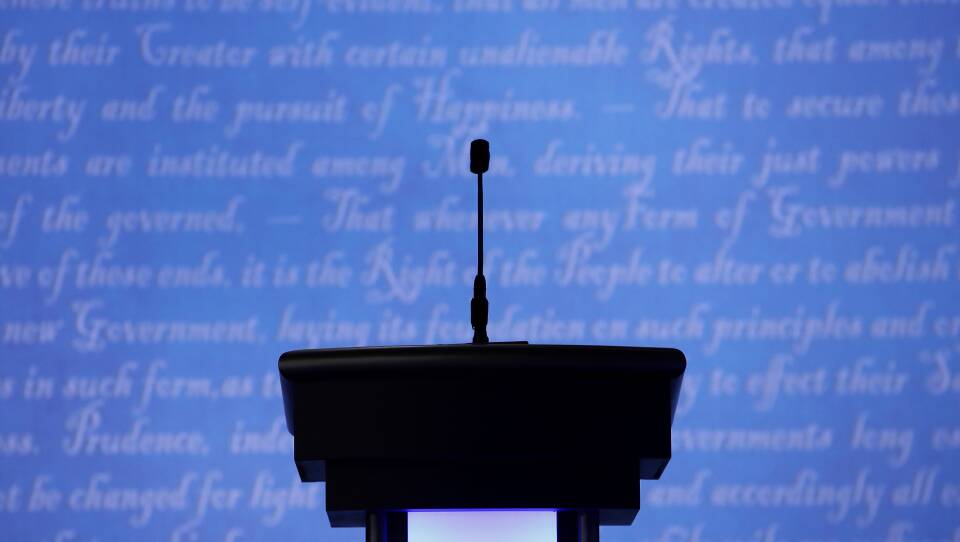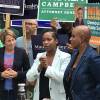In an election marked by widespread ignorance among many voters, a seeming disinterest in debates among top Democrats could increase the odds of Massachusetts residents casting ballots without a strong sense of who they’re voting for.
At present, Attorney General Maura Healey, the Democratic candidate for governor, has agreed to just one debate with Geoff Diehl, a former Republican state representative who was an early supporter of Donald Trump.
In contrast, in 2018, Republican Gov. Charlie Baker debated Democratic challenger Jay Gonzalez three times.
Healey’s debate with Diehl is slated for October 20, weeks after Massachusetts cities and towns will likely have received mail-in ballots and distributed them to residents. In the recent primary election, more than half of the ballots cast were submitted by mail.
Democratic AG nominee Andrea Campbell — who Healey endorsed and campaigned with in the primary — has indicated she may not debate Republican Jay McMahon at all.
“We’ll see,” Campbell said Monday on GBH’s Boston Public Radio.
Campbell also suggested that voters interested in the AG’s contest watch a forum that was sponsored by the Worcester Bar Association on August 24. Candidates did not directly engage each other at that event, which featured McMahon, Campbell and two other Democrats — one of whom, Quentin Palfrey, subsequently dropped out and endorsed Campbell after sharply criticizing her candidacy for months.
In a subsequent interview, Campbell said she’s “not opposed” to debating McMahon, but added, “It's just not at the top of my list right now."
McMahon has called for seven debates in that race.
The reluctance from the Democrats at the top of the ticket comes at a moment when a large portion of the Massachusetts electorate seems deeply uninformed about its choices.
In the state’s recent primary elections, roughly three-quarters of voters submitted Democratic primary ballots. But based on the results of a MassINC Polling Group survey conducted in mid-August, many of them them were flying blind when it came to the candidates.
In that poll, 76 percent of likely Democratic primary voters said they’d never heard of Diana DiZoglio, who’s now the Democratic nominee for auditor. Fifty-five percent said they’d never heard of Kim Driscoll, now the nominee for lieutenant governor. Nearly half — 49 percent — said they’d never heard of Campbell. And almost a third — 30 percent — said they hadn’t heard of Secretary of State Bill Galvin, who’s been in office for nearly three decades and is seeking an eighth term.
Geoff Foster, the executive director of Common Cause Massachusetts, said that by forgoing or limiting debates, candidates miss a key opportunity to educate and engage voters.
“The value of debating in a democracy shouldn’t be understated,” Foster said. “It’s a proven part of the process that helps voters become informed and make decisions on who is best to represent them in government. Voters deserve to know where candidates stand on certain issues, and debates and candidate forums are one of the best tools we have.”
While some candidates can also introduce themselves to voters via campaign literature and retail politicking, Foster added, those methods can be “more ambiguous on issues. Whereas debates and candidate forums do a much better job of getting candidates on the record for specific policy positions.”
Common Cause is a nonpartisan organization that does not endorse or support individual campaigns.
"Frontrunners have a lot more to lose."Tammy Vigil, an associate professor of media science at Boston University
In the governor’s race, Diehl, who trails Healey by a substantial margin in recent polling, has called for at least three debates this year. But he may have weakened his own case during the Republican primary by agreeing to just one debate with his then-opponent, businessman Chris Doughty.
In that contest, Diehl was the clear favorite. As a result, said Tammy Vigil, an associate professor of media science at Boston University, he had the same incentive to limit debates that Healey does now.
“Frontrunners have a lot more to lose,” Vigil said. “So it’s not unusual to have frontrunners who say, “Eh, I don’t really want to do that.”
A Healey campaign spokesperson said Wednesday that, in addition to the Oct. 20 event, Healey is considering participating in other debates as well.
The respective candidates for lieutenant governor, Driscoll and Republican Leah Cole Allen, are not seeking election independently. Instead, each is running on a ticket with their party’s nominee for governor.
Despite that lack of autonomy, though, a case can be made that candidates for LG deserve intense scrutiny in their own right. The LG chairs the Governor’s Council, which oversees judicial nominations in Massachusetts, and runs the state when the governor is absent. When governors leave mid-term, the LG takes over until the next election cycle, with the full powers of the governorship at his or her disposal.
In 2018, however, Palfrey — who was then the Democrats’ nominee for LG — and Karyn Polito, the Republican incumbent, debated just once on GBH News’ Greater Boston.
A spokesperson for Driscoll said she “is committed to debating her opponent and looks forward to doing so as debate opportunities take shape in the coming weeks.”
There are signs that the race for state auditor may yield more debates than other statewide contests. Anthony Amore, the Republican nominee, has called for five debates, and a DiZoglio spokesperson said she “looks forward to participating in multiple debates.”
A different dynamic is at play in the race for secretary of state, in which Republican Rayla Campbell’s penchant for provocation may give Galvin, the seven-term incumbent, a rationale for avoiding a debate altogether. Neither candidate responded to requests for comment.
At the Mass. GOP’s nominating convention in May, for example, Campbell suggested that Massachusetts 5-year-olds are currently being taught to perform oral sex on each other. And in June, Campbell filmed herself disrupting a drag-queen story hour at the Holbrook Public Library, demanding to know if the performer had been subjected to a criminal-records check and repeatedly stating, “I’m protecting children.”
“Candidates owe the public a clear statement and clear means of differentiating,” Vigil, the BU professor, said. “But in a lot of cases, you can’t always trust your opposition to engage in an accurate, fair, and informed debate.
“For some candidates, it makes sense to offer other ways of getting the contrasts and the statements out,” Vigil added. “Because there is a lack of trust — especially these days — in the ability or the willingness of the opponent to actually engage in a debate that is informed by reason.”
If Galvin, a veteran political operator known for his ability to leverage almost any situation to his advantage, is looking for an excuse not to engage, that may be all he needs.








